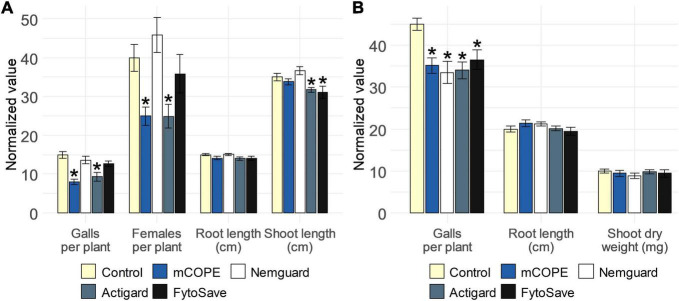FIGURE 6.
Cucurbitaceae COld Peeling Extract (CCOPE) derived from melon (Cucumis melo var. cantalupensis; mCOPE) leads to similar or better protection for the pathosystems (A) rice-Meloidogyne graminicola (Mg) and (B) tomato-Meloidogyne incognita (Mi) when compared to commercially available nematicides or IR stimuli. (A) Normalized infection and growth parameters, as assessed for rice plants 14 days post inoculation with 250 Mg second-stage juveniles (J2s). (B) Normalized infection and growth parameters, as assessed for tomato plants 28 days post inoculation with 250 Mi J2s. (A,B) One day before inoculation, shoots of 14-days-old plants were treated with the buffer used for CCOPE preparation, mCOPE, Actigard® [250 μM benzothiadiazole (BTH)] or FytoSave® [0.5% (v/v), corresponding with a chito-oligosaccharides and oligogalacturonides (COS-OGA) concentration of 12.5 g/L]. A solution of 0.133 g/L Nemguard® was administered via soil drenching 1 day before nematode inoculation according to the manufacturer’s instructions. Error bars represent the standard error of the mean. Asterisks indicate significant differences upon comparison of all treatments with same-aged, mock-treated control plants. Statistical differences were determined via a two-sided heteroscedastic t-test (p < 0.05). Asterisks indicate statistically significant differences upon comparison of CCOPE- and mock-treated cells.

